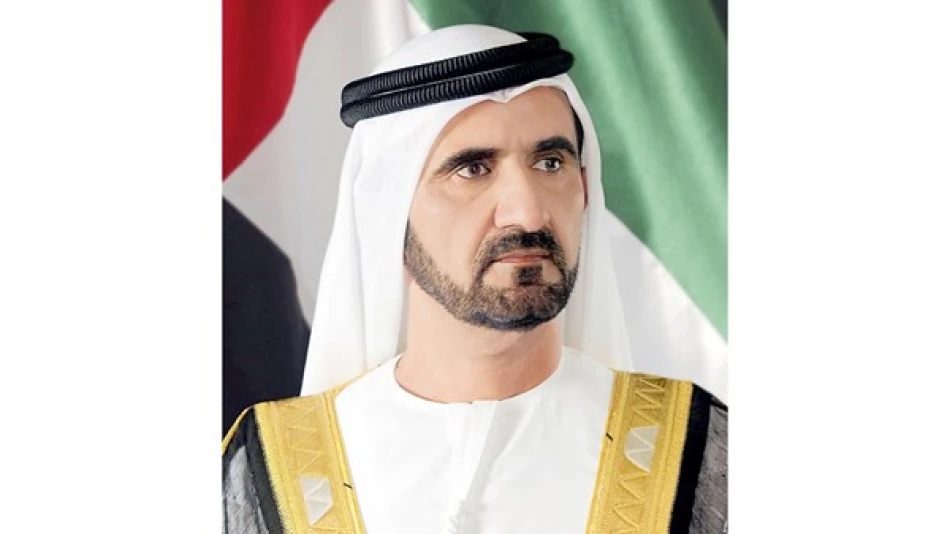
Dubai Government Employees Granted Paid Marriage Leave by Sheikh Mohammed
Dubai Launches Paid Marriage Leave to Boost Emirati Birth Rates and Social Stability
Dubai has introduced a groundbreaking 10-day paid marriage leave policy for government employees, marking the latest effort by Gulf states to encourage traditional family formation among their citizens. The decree, issued by Sheikh Mohammed bin Rashid Al Maktoum, specifically targets Emirati nationals marrying other UAE citizens, reflecting broader demographic concerns across the region where expatriates vastly outnumber locals.
A Strategic Response to Demographic Challenges
The timing of this policy reveals deeper strategic thinking about the UAE's demographic future. With Emiratis comprising less than 12% of the country's population, government initiatives increasingly focus on strengthening citizen welfare and encouraging family formation. This marriage leave policy joins a growing arsenal of pro-natalist measures across the Gulf, where governments worry about maintaining cultural identity amid rapid expatriate population growth.
The decree covers all Emirati government employees, including those in Dubai's powerful free zones like the Dubai International Financial Centre, judiciary members, and military personnel. By restricting benefits to marriages between UAE nationals, the policy clearly prioritizes demographic consolidation over broader social integration.
Generous Terms Signal Government Priorities
The policy's structure demonstrates sophisticated workforce management thinking. Employees receive full salary and benefits during their 10-day leave, can combine it with other vacation time, and enjoy flexibility in timing—using days consecutively or separately within a year of marriage. Government agencies cannot recall employees during marriage leave except for military personnel in emergencies.
Particularly notable is the policy's portability: employees retain unused marriage leave when transferring between government entities, ensuring the benefit isn't lost to bureaucratic transitions. This detail suggests long-term planning for career mobility within Dubai's extensive public sector.
Regional Context and Competitive Dynamics
Dubai's move follows similar demographic initiatives across the Gulf. Saudi Arabia has launched extensive programs supporting marriage and childbearing, while Qatar offers substantial family allowances for citizens. The UAE itself provides significant financial incentives for Emirati marriages, including housing support and wedding grants.
Unlike Western countries where marriage leave might focus on work-life balance, Gulf states explicitly link such policies to national identity preservation. This reflects unique challenges facing resource-rich nations dependent on massive expatriate workforces but concerned about cultural dilution.
Economic and Social Implications
For Dubai's economy, the policy represents a calculated investment in social stability. Government employees form a significant portion of the Emirati workforce, and their job security makes them ideal targets for family-formation incentives. The policy's cost appears minimal compared to broader demographic risks of citizen population decline.
The requirement for marriages contracted after December 31, 2024, prevents retroactive claims while establishing clear implementation boundaries. This administrative precision suggests the policy underwent careful legal and financial review, indicating serious governmental commitment rather than symbolic gesture.
Broader Implications for Gulf Governance
This initiative reflects evolving Gulf governance models where citizen welfare increasingly drives policy innovation. By focusing on life transitions like marriage, governments demonstrate understanding that demographic challenges require nuanced social interventions beyond simple financial incentives.
The policy's emphasis on "psychological and family stability" signals recognition that modern governance must address emotional and social needs, not just economic ones. This represents sophisticated thinking about citizen satisfaction and national cohesion in rapidly changing societies.
Dubai's marriage leave policy ultimately serves as both practical workforce benefit and symbolic statement about government priorities. Its success will likely influence similar initiatives across the region, as Gulf states continue balancing modernization with cultural preservation in their unique demographic contexts.
Most Viewed News

 Layla Al Mansoori
Layla Al Mansoori






